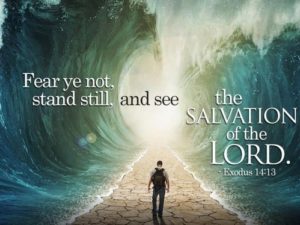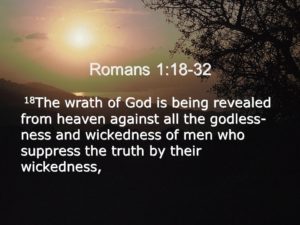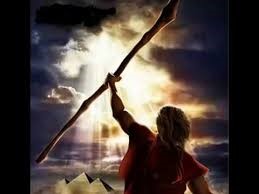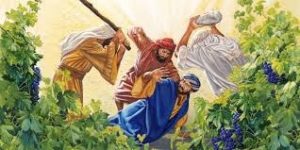 I encourage you to read this account of the children of Israel crossing the Red Sea. It is another defining moment in the history of Israel and the Bible’s overall history of redemption. It is monumental.
I encourage you to read this account of the children of Israel crossing the Red Sea. It is another defining moment in the history of Israel and the Bible’s overall history of redemption. It is monumental.
It is interesting to note that when Pharaoh released the Israelites to go, God did not lead them on a normal path. He had a chosen road for them. It was not the shortest road. It might not have been the easiest road, but it was the wisest (Exodus 13:17-18). We must trust that the chosen road for us, no matter how hard it may feel, is the wisest.
It is also important to recognize that “The Israelites went up out of Egypt armed for battle.” (Exodus 13:18). When we are saved, as miraculous as it is, our troubles are not all behind us. We must be ready for the spiritual battles ahead.
We see God’s faithfulness in the fact that His presence is encamped with those whom He redeemed. “Neither the pillar of cloud by day nor the pillar of fire by night left its place in front of the people.” (Exodus 13:22)
Once again Pharaoh’s hardened heart causes him to regret any concession made to the Israelites (Exodus 14:5). His stubborn determination sends him in hot pursuit of his runaway slaves. He takes his top officers and best equipment with him to seize the opportunity to recover his workforce and regain control over them.
God’s sovereignty will bring Pharaoh to judgment by hardening further his already hardened heart and allow him to pursue his own desires to the point of self-destruction.
This reminds us that God’s most severe judgments are when He allows us to do what we have already determined to do in our stubborn hearts. Pharaoh had repeatedly hardened his heart when confronted with God’s light (Exodus 7:13,22, 8:15, 19:32; 9:7; 34, 35). The time had come for the Lord to cement Pharaoh’s hardened heart in its wayward direction for His own purposes. (9:12, 10:1, 20, 27; 11:10; 14:8)
In the New Testament, the Apostle Paul explains that when people resist and suppress God’s initiatives to make Himself known (Romans 1:18-23), He “gives them over” to their own desires allowing them to reap judgment upon themselves (Romans 1:24, 26, 28).
The children of Israel, having been led by the Divine Guidance System of both the angel of the Lord and the pillar of cloud by day and fire by night, reach an impasse. They are stunned as they stare at the barrier of the Red Sea before them and realize that they are boxed in and have nowhere to turn.
With the enemy rapidly approaching from behind, the Israelites begin a mutinous grumble against their leader, Moses, “Was it because there were no graves in Egypt that you brought us to the desert to die?”
Exodus 14:13-14 (NASB)
13 But Moses said to the people, “Do not fear! Stand by and see the salvation of the LORD which He will accomplish for you today; for the Egyptians whom you have seen today, you will never see them again forever. 14 “The LORD will fight for you while you keep silent.”
The Lord had brought his people to a place where all they could do is STAND BY. The words imply that they were to both stand still and stand ready. They were to await instructions.
How often are we brought to those situations that box us in to reckon with God? We DO have a place to turn. Stand still. Stand ready. And SEE what God will do. See the salvation of the Lord.
We need to realize the limitations of our natural resources and learn to trust God. How can we part the waters, move the mountains and defeat the armies of a superpower? We can’t, but He can. And He will if it suits His purposes.
“I will fight for you while you keep silent.” This was not a war between Israel and Egypt. It was a war between the Lord and Egypt. This battle belonged to the Lord and He will show that He reigns supreme above all else. We wrestle not against flesh and blood (Eph 6:12). Jesus has been given all authority (Matt 28:19). Let Him rebuke your enemies and confound them (Jude 1:9)!
How shocking are the next words that Moses hears!
The Lord says to Moses, “Tell the people to get moving!” (Exodus 14:15)
The big question is, “Where?”
Moses is told that they are to get moving in a direction that now they realize, apart from God’s intervention, is one of certain death. They are called to walk by faith and not by sight. This is the faith that says, “If I perish, I perish” (Esther 4:16). It is the faith that says, “Though He slay me I will trust Him” (Job 13:15). It is the faith that says, “Our God whom we serve is able to deliver us, and He will deliver us… but even if He does not, let it be known..” we are trusting in the Lord (Daniel 3:17-18). It is the faith of Jesus Christ who says in the face of imminent death, “Nevertheless Thy will be done” (Matt 26:42).
In the meanwhile, Moses is to lift up his staff and stretch out his hand over the sea and see the Lord create a way where there was no way.
Exodus 14:21-23 (NASB) 21 Then Moses stretched out his hand over the sea; and the LORD swept the sea back by a strong east wind all night and turned the sea into dry land, so the waters were divided. 22 The sons of Israel went through the midst of the sea on the dry land, and the waters were like a wall to them on their right hand and on their left. 23 Then the Egyptians took up the pursuit, and all Pharaoh’s horses, his chariots and his horsemen went in after them into the midst of the sea.
What is not possible with man becomes possible with God.
The New Testament makes clear that the Exodus of the children out of Egypt is a picture of our salvation. We are delivered from the ruler of this age, Satan, by being ‘baptized unto’, or ‘identified with’ a Greater Moses, Jesus Christ.
1 Corinthians 10:1-2 (NASB) 1 For I do not want you to be unaware, brethren, that our fathers were all under the cloud and all passed through the sea; 2 and all were baptized into Moses in the cloud and in the sea;
The Apostle Paul says that the crossing of the Red Sea is a vivid and instructive picture of those who believe the gospel, being identified with Christ in His death, burial and, resurrection. 164 times in the New Testament we read that believers are positioned ‘in Christ’. What pertains to Christ now pertains to us. God has rewritten our history “in Christ” so that from God’s point of view when Jesus died, we died, and when He was buried, we were buried, and when He rose, we rose. We enjoy all the benefits of being ‘hid with Christ’ in God. (Col 3:3). His inheritance becomes our inheritance.
1 Corinthians 10:11 (NASB) 11 Now these things happened to them as an example, and they were written for our instruction, upon whom the ends of the ages have come.
Paul reminds us that although the children of Israel were now out of Egypt, Egypt was not yet out of them. Although they had crossed over the Red Sea on dry ground, through their identification with Moses, they were not yet experiencing the promised land. They needed to take steps of obedience where they would continually reckon themselves dead to self and alive to God through trusting the Lord.
The future episodes in the wilderness will show us how God works in the lives of His people. He has gotten them out of Egypt. Now He needs to get Egypt out of them. We are no longer of the flesh, or of the world, or of the devil. But we need to be delivered from their influences upon us.
This chapter shows God’s faithfulness in fulfilling prophecy. Centuries earlier the Lord had told Abraham:
Genesis 15:13-14 (NASB) 13 God said to Abram, “Know for certain that your descendants will be strangers in a land that is not theirs, where they will be enslaved and oppressed four hundred years. 14 “But I will also judge the nation whom they will serve, and afterward they will come out with many possessions.
In the Book of Exodus, we read,
Exodus 12:41 (NIV) 41 At the end of the 430 years, to the very day, all the LORD’s divisions left Egypt.
Psalm 105:37 (NIV) 37 He brought out Israel, laden with silver and gold, and from among their tribes no one faltered.
We see God’s faithfulness in other details of this story.
Before Joseph died, he expressed his faith in God’s promised future.
Hebrews 11:22 (NASB) 22 By faith Joseph, when he was dying, made mention of the exodus of the sons of Israel, and gave orders concerning his bones.
Joseph had asked that his bones be buried in the Promised Land. He was thoroughly identifying with that promised reality. The continuity of the Bible’s storyline is seen as Moses ensures that the bones of Joseph are brought with them as they leave Egypt. In Exodus 13 we read,
Exodus 13:19 (NASB) 19 Moses took the bones of Joseph with him, for he had made the sons of Israel solemnly swear, saying, “God will surely take care of you, and you shall carry my bones from here with you.”
Another generation would pass, and we read in the Book of Joshua:
Joshua 24:32 (NASB) 32 Now they buried the bones of Joseph, which the sons of Israel brought up from Egypt, at Shechem, in the piece of ground which Jacob had bought from the sons of Hamor the father of Shechem for one hundred pieces of money; and they became the inheritance of Joseph’s sons.
Today’s Old Testament reading ends with the Victorious Song of Moses and Miriam. They have a lot to sing about and so do we. In the last book of the Bible the redeemed of the Lord, both the Jews and Gentiles, will unite together and sing the song of Moses and the song of the Lamb. (Revelation 15:1-3)
“Great and marvelous are Your works, O Lord God, the Almighty; Righteous and true are Your ways, King of the nations! “
We can all praise God that He has triumphed gloriously in both the Exodus of the people of Israel which He accomplished at the Red Sea and the Greater Exodus which He accomplished at Calvary!
NEW TESTAMENT READING: MATTHEW 21:23-46
These events take place in the last week of Jesus’ life before the crucifixion, during the 4 days between the 10th of Nisan and the 14th (Passover.) The elders of Israel continue to examine the nation’s Passover Lamb (Jesus of Nazareth) to see if they can find a blemish or fault in Him. Jesus’ wisdom confounds them (21:23-27) and His parables expose their wickedness (21:28-46).
The Parable of the Landowner (21:33-40) has to do with the history of Israel, often looked upon as the Lord’s vineyard (See the Parable of the Vineyard in Isaiah 5). The vine-growers were the custodians of Israel (leaders) who were to receive those servants of the vineyard owner (God’s messengers- the prophets). Jesus’ final episode in the parable is the current one in the lives of the scribes and the Pharisees. The Vineyard Owner has sent His Son, the heir, into the vineyard, certain that the custodians would receive and revere Him. Instead, they throw him out of the vineyard and kill him. Jesus then quotes a Messianic prophecy, Psalm 118:22 that demonstrates how those who fail to recognize the Messiah and cast him out (as did the custodian vine-growers in the parable) will one day realize Who He is. God will raise Him from the dead. The stone the builders rejected will be made the chief cornerstone (both Lord and Christ-Messiah) in what God originally called them to build.
TODAY’S READING IN THE BOOK OF PSALMS- PSALM 26:1-12
Psalm 26 is an example of the prayer of one who has a record of righteousness before the Throne.
“Seek first the kingdom of God and His righteousness” (Matthew 6:33).
Psalm 26 is the prayer of the one who has a testimony of God’s absolute righteousness as they stand before Him. Of course, this testimony is the testimony of “the Lord our righteousness” (Jeremiah 23:6; 33:16). He alone is righteous in His own right, as He stands before the Father.
1 John 2:1 1 My little children, I am writing these things to you so that you may not sin. And if anyone sins, we have an Advocate with the Father, Jesus Christ the righteous.
We can read Psalm 26 as a Psalm that echoes the heart cry of Jesus Christ, the spotless Lamb of God, as He lived life in a human body tested and tempted at every point. We can also read this Psalm as an ‘in Christ one’ who has a heart to walk in the Spirit and follow after righteousness.
Make this your prayer as you pray it out loud.
When we stand on the even place, the leveling ground at the foot of the cross, we realize we have no righteousness of our own, but wholly lean on the mercy shown to us by Him who died for us.
2 Corinthians 5:21 21 He made Him who knew no sin to be sin on our behalf, so that we might become the righteousness of God in Him.
Psalm 26:11-12 11 But as for me, I shall walk in my integrity; Redeem me, and be gracious to me. 12 My foot stands on a level place; In the congregations I shall bless the LORD.
TODAY’S READING IN THE BOOK OF PROVERBS- Proverbs 6:16-19
Proverbs 6:16-19 16 There are six things which the LORD hates, Yes, seven which are an abomination to Him: 17 Haughty eyes, a lying tongue, And hands that shed innocent blood, 18 A heart that devises wicked plans, Feet that run rapidly to evil, 19 A false witness who utters lies, And one who spreads strife among brothers.
The construction of the Proverb: There are six things, yes seven, is designed to give emphasis to the last item. In this case the effect of evil-doing- spreading strife among brothers. Strife, however, can be caused by the littlest thing- one look from the eye, one word from the tongue, one deed with the hand, a plan in the heart, a direction with evil intent, and character assassination with a false witness.
PRAYER- Lord, as we read of the great work of salvation that You accomplished for Israel, we can’t help but think of the work that Christ accomplished for us. He came to fulfill Your holy demands for righteousness on our behalf. There is nothing worthy of vindication in my name if I were to stand in my own merits. But Your Name is worthy of vindication. And Your Name is “The Lord our righteousness”. You were tempted at every point, yet without sin. Thank You for the mercy that clothes us with Your righteousness when we stand on the equal ground at Calvary and admit that we cannot justify ourselves through our own works, but only by wholly leaning on Jesus Name! My hope is built on nothing less!
Pastor David
